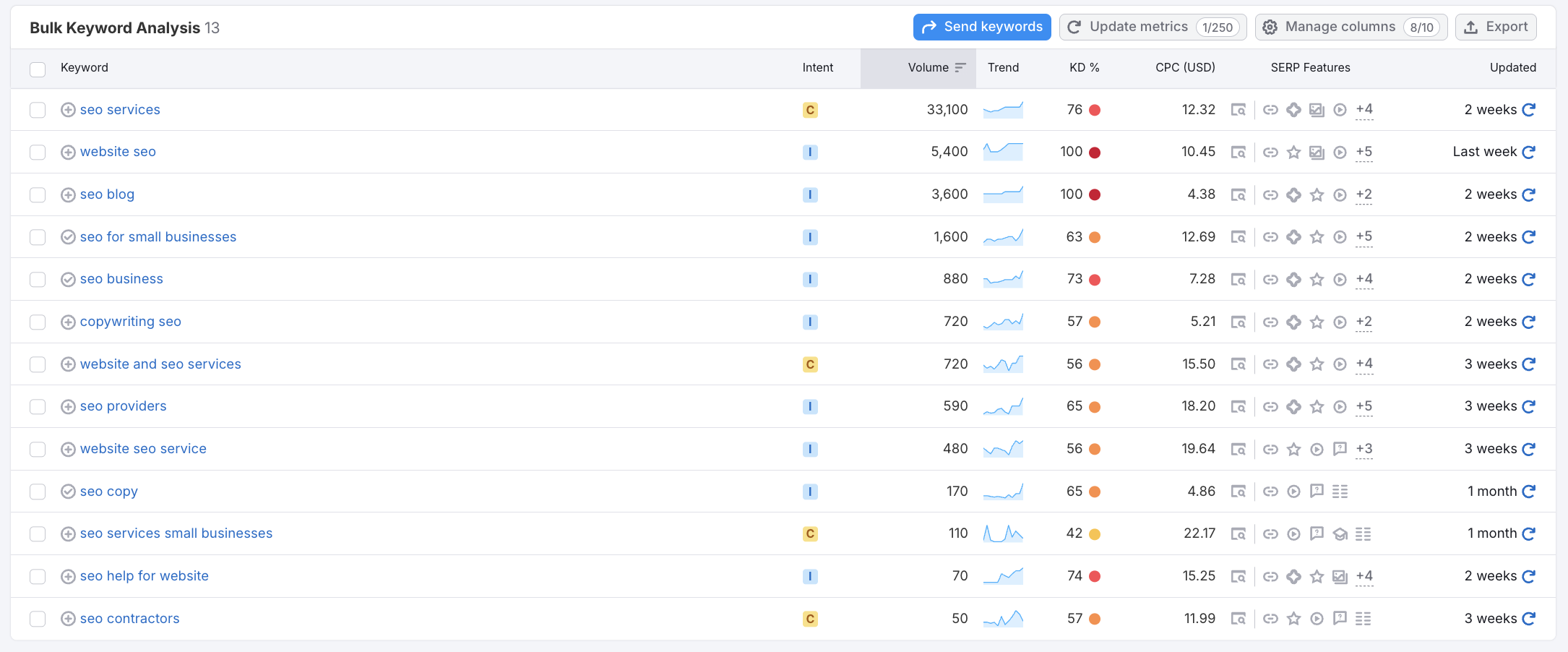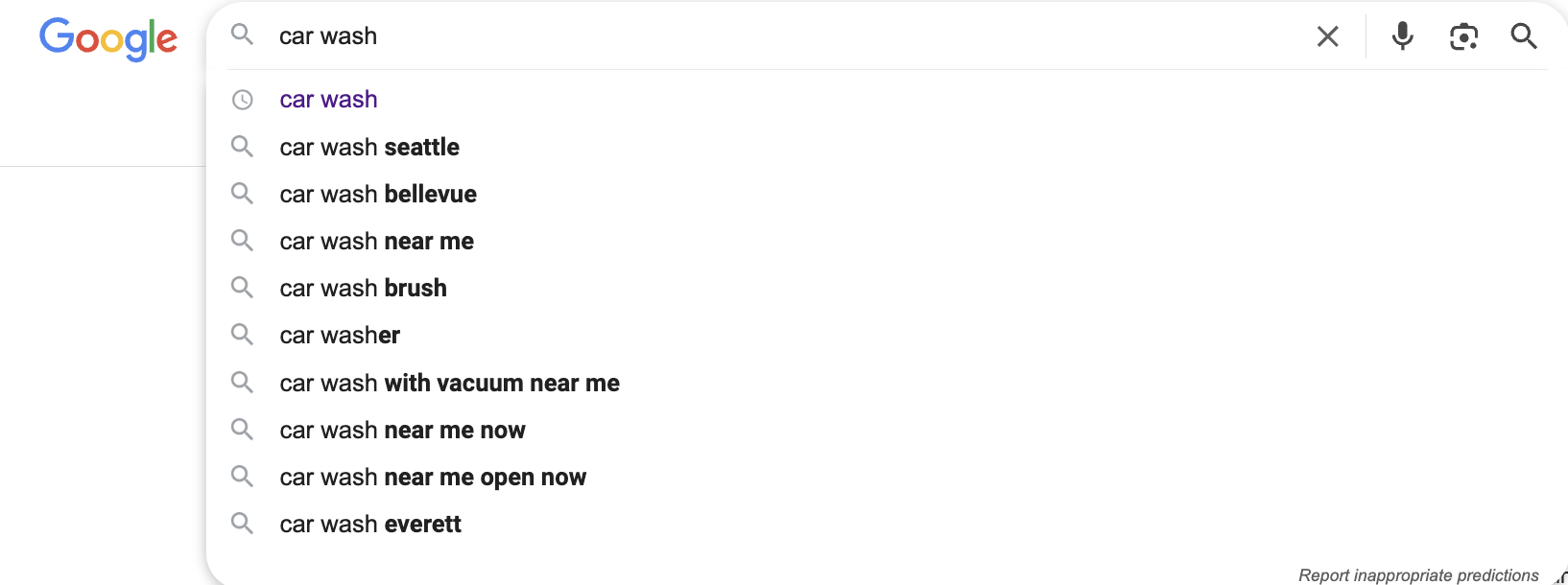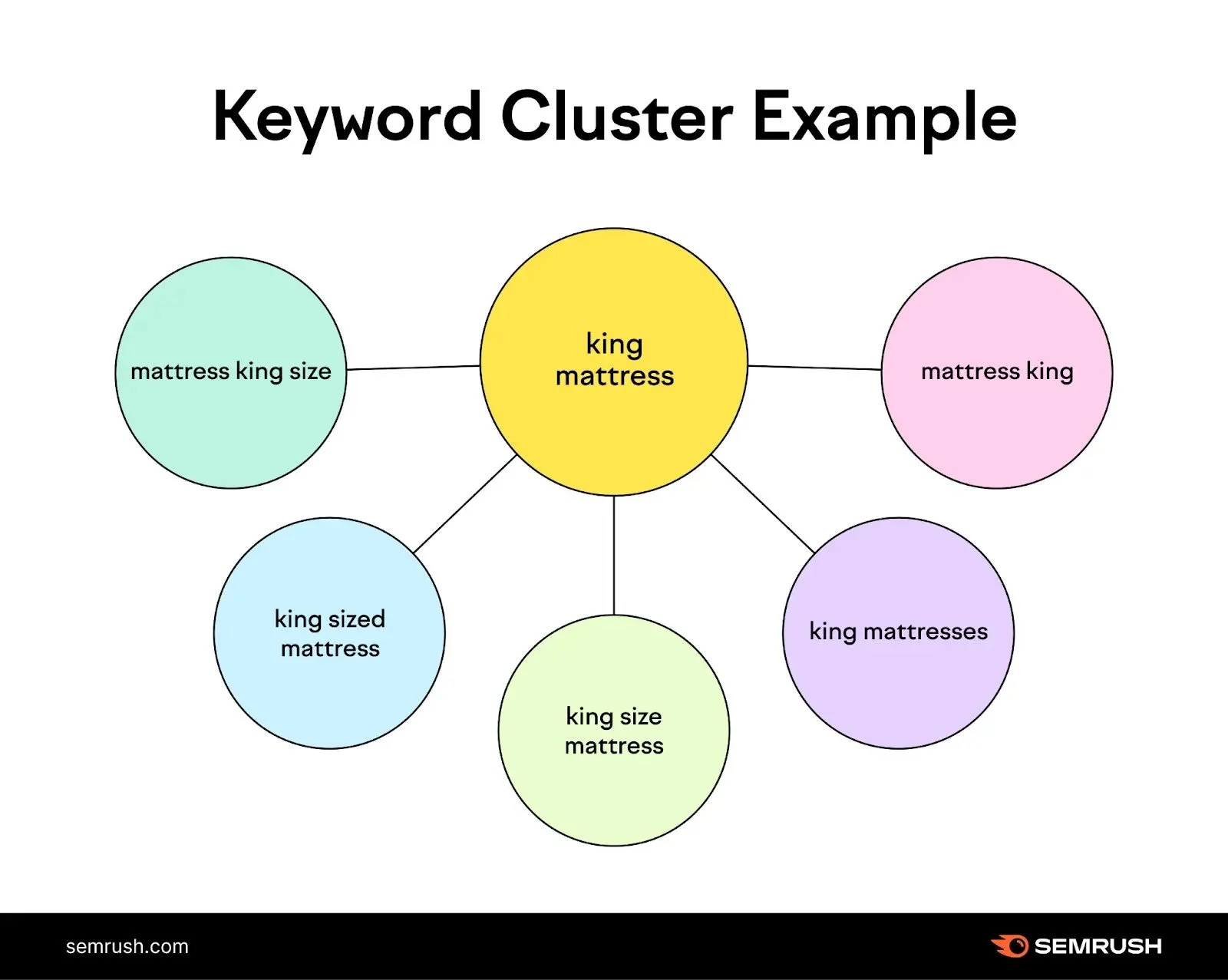11 Effective Keyword Research Techniques for Improved Organic SEO Traffic
Almost every failed SEO strategy can be traced back to ineffective keyword research.
Why? Because it’s so easy to take shortcuts. People imagine that choosing the right keyword is as simple as describing what their page is about. They believe that the moment they decide the target keyword will be, say, “keyword research techniques,” that Google will tuck their guide in a nice little envelope and shoot it out to all of their users.
If only it were so simple.
Choosing the right keyword is just as much about your audience, your competitors, and the search engines themselves as it is your content. There’s a reason why resources like Ahrefs and Semrush charge hundreds of dollars a month for access to their platform — the information is valuable. But that doesn’t mean you need to drain your budget to make it work. With the right approach (and a little patience), you can build a powerful keyword strategy on your own.
In this guide, I’ll show you how.
Table of Contents
What Makes a Good Keyword?
A good keyword has very little to do with search volume and everything to do with fit. Whether you are a brand-new small business or an established brand, your target keywords should be:
Relevant to your content, service, or product
Specific enough to stand out without sounding unnatural
Rankable within your site’s domain strength and industry niche
There is no one-size-fits-all keyword. “Running shoe” might be perfect for Nike. But if you’re a small athletic brand, targeting a broad, high-competition term like that will leave you buried within the results pages.
The right keyword is the right keyword because it works for you. Align your strategy with your unique market position — and give yourself a real chance to compete.
What Does a Keyword Do?
A keyword isn’t a label or a tagline. You’re not slapping it on your homepage like a bumper sticker and hoping Google takes the hint.
Instead, keywords work as signals — subtle clues embedded throughout your content that tell search engines what your page is really about.
That means incorporating them into:
Page titles and H1/H2 tags
Meta descriptions and slugs
Paragraph copy and anchor text
Image alt text and file names
And just as importantly: including variations, synonyms, and related terms that help build topical relevance. Ideally, while every page should have a target keyword, you’d love for it to be ranking for five, ten, fifteen, a hundred keywords.
11 Keyword Research Techniques to Grow Your Organic Traffic
1. Research Your Target Audience
Always remember that the job of a keyword is to connect you with your audience. Therefore, understanding your audience is just as important as the content you’re providing. What does your ideal customer want? What questions are they asking?
If you can predict the needs of your audience and provide them with the content, solutions, or services they’re looking for, it’ll be your page they find at the top of the SERPs.
Explore Reddit and other forums to learn how people describe their issues
Dig through competitor blogs, comment sections, and reviews to see what gaps to fill
Use AnswerThePublic to discover common questions by topic
2. Brainstorm Relevant Keyword Ideas
Keyword ideas from Google’s Keyword Planner for InYourWordsCopy.com
While simple and obvious, compiling a long list of off-the-dome keywords is a great place to start your research. What do you do? What services do you provide? What questions or topics do you find yourself talking about on an average day? What makes you an expert?
Then go broader. What informational content connects to your offer? If you’re a nutritionist offering one-on-one coaching, relevant blog topics might include “protein-rich vegetarian meals” or “symptoms of nutrient deficiencies.”
Throw your website’s URL into Keyword Planner’s “discover new keywords” tool to generate a long list of relevant keywords
Ask ChatGPT to generate a list of keywords based off your service or industry
Google’s “People Also Search For” section can provide useful variations on your primary keywords
3. Generate Long-Tail Keywords
The first keywords you think of are likely broad and highly competitive. A term like “meal prep” may apply to your page but will be extremely difficult to rank for. That’s where a long-tail keyword like “easy meal prep for busy moms” might both fit your page’s intent better and have far less competition.
Examples:
stock footage »» 35mm stock footage of New York City
yoga class »» beginner yoga class for stress relief at home
copywriter »» website copywriter for online small businesses
If you already have a product or service that you are optimizing, simply be specific to its attributes — without exaggerating or lying. But if you are creating content as part of an SEO strategy, it is often a good idea to find the keyword first before tailoring the blog article to the intent.
Use Google’s autocomplete to see what searches are trending
Get the most out of free resources like Keyword Tool IO or AnswerThePublic
Plug your seed keyword into Semrush’s Keyword Magic Tool (or Ubersuggest) and filter for longer phrases
4. Take Advantage of Questions & Natural Language
We don’t search like robots. People Google things like:
“How do I get mouse smell out of my car?”
“Best lightweight trail runners for wide feet”
“What foods support hormone balance?”
Keyword Ideas for “foods for hormone balance” from AlsoAsked.com
By targeting these types of queries, you’re meeting users where they are — and giving yourself a better shot at showing up in featured snippets and “People Also Ask” boxes.
Use AnswerThePublic and AlsoAsked.com to uncover question-based keywords
Search your own topics and check the FAQs Google includes
Write in a conversational tone that mirrors how your audience actually speaks
5. Understand User Intent
User intent is one of the most important — if not the most important — parts of SEO. Google’s goal is to provide users with the information they’re actually looking for.
There are four main types of search intent:
Informational: the user wants to learn something. (e.g., “what is protein powder?”)
Navigational: the user wants to find a specific site. (e.g., “Ahrefs blog”)
Transactional: the user is looking to buy or do something. (e.g., “t-shirts for women”)
Commercial investigation: the user is researching options. (e.g., “best home theater systems”)
Why it’s so important — If you write an informational blog post for a transactional keyword, it will be nearly impossible to rank. Think of it this way: if someone searches “best standing desk for home office,” they want a list of products — not a how-to guide on desk ergonomics.
Quick test: Google the keyword. What ranks on page one? That’s what Google believes matches the user’s intent — and that’s what you should aim to match or improve upon.
6. Analyze Search Volume and Competition
Once you have a list of keywords, the next step is determining which ones are actually worth targeting. Two metrics matter that matter most are:
Search volume: how many people are searching for this keyword each month?
Keyword difficulty (KD): how competitive is it to rank on page one?
The perfect keyword would have a high search volume and a low keyword difficult — but these opportunities are rare. So, instead, you must attempt to hit the sweet spot: enough volume to matter, and low enough competition to actually have a shot at ranking.
For new companies with little domain authority, it is far more important that you target low-competition keywords than worry about volume. Even a keyword with 20-40 searches a month can make a difference if you can rank on the first page.
Google gives users solid volume and KD metrics through Keyword Planner, but paid programs like Semrush provide much more in-depth metrics. Compare these results to those shown above.
Keyword research data provided by Semrush
Volume and KD data is exceptionally valuable and worth paying for if you have the budget, but don’t discount the abilities of free or budget-friendly options.
7. Explore Seasonal and Trending Keywords
Search behavior isn’t static — it changes with seasons, events, and trends.
If you sell gifts, expect spikes around the holidays. If you write about nutrition, expect “detox” to trend in January and “gut health” to peak after Halloween (true story — all that candy takes a toll).
To uncover trends, consider using:
Google Trends: plug in a keyword and see its popularity over time
Exploding Topics: great for spotting emerging trends
Pinterest Trends: especially useful for lifestyle, home, food, and wellness
Google Trends data of Tyrese Haliburton during NBA Playoffs
Tip: Never forget the power of updating old content. Revising a guide with updated statistics, tips, etc. on a yearly basis can help shoot it back up the rankings — just put (Updated 2025) in the title
8. Location-Specific Keywords (if necessary)
If you provide local services (plumbers, electricians, lawyers) or rely on in-person traffic (restaurants, hair salons, clothing stores), then it’s essential you prioritize a local SEO campaign — and this includes location-specific keywords like:
“Seattle freelance copywriter”
“best yoga studio in Austin”
“Mexican food truck Denver”
Google favors local results for location-specific searches, so these keywords can be less competitive — and far more actionable.
How to find them:
Use Google’s autocomplete (start typing “car wash in…” and note suggestions)
Look at your competitors’ titles and metadata
Use Google Keyword Planner and filter by region
If you’re trying to rank outside your region, be strategic — Google often prioritizes businesses with a local address and presence (via Google Business Profile).
Check out my guide on Optimizing Images with Local Keywords for even more tips.
9. Competitor Keyword Analysis
Picasso said, “Good artists copy; great artists steal.” Ditto for copywriters.
If you find that your competitors are bringing in more organic leads, find out what they’re doing well. See what keywords they’re ranking for, what sort of content they’re providing, and what gaps you could fill — or improve on.
Manually scan high-ranking competitor blog posts and inspect their headings, meta descriptions, and URL slugs
Use Semrush’s Domain Overview to see competitor rankings, keyword gaps, and more.
Organic keyword research for remirosenutrition.com via Semrush
You don’t need to copy their strategy — but you do want to understand it. Then build something better.
10. Keyword Clustering
Keyword clustering is the art of grouping related keywords together — and creating one piece of content that satisfies all of them. This allows you to build more in-depth content that avoids keyword cannibalization and helps you rank for more variations with less content.
Instead of writing four blog posts, you’d combine them into one detailed guide. Each H2 or H3 targets a related term — and the whole page becomes more valuable.
Tools like Surfer SEO and Semrush can help you build clusters, but you can also do it manually by grouping similar keywords and analyzing SERP overlap.
11. Content Gap Analysis
A content gap analysis is the straightforward process of finding topics your competitors are covering that you aren’t. It’s a clear indication of content your audience is searching for and allows you the opportunity to study your competitor’s work and improve upon it.
How to do it:
Compare your site’s content with a competitor’s (Ahrefs and Semrush both have built-in tools)
Search your main keyword and explore “People Also Ask” and “Related Searches”
Audit your own site — are there topics you’ve overlooked, undercovered, or failed to go deep on?
You’ll often find high-potential, low-effort ideas just sitting there — waiting to be developed into ranking content.
Bonus: Always Study the SERPs
There are countless SEO and keyword research tools out there for you to use, but don’t forget that the most important resource is the most obvious: the search engine result pages (SERPs).
Before targeting any keyword, always study the first page of Google and ask:
What types of pages are ranking? (blogs, product pages, video results?)
What’s the content length, style, and tone?
Are there featured snippets, image packs, FAQs?
What’s missing?
This tells you what Google values — and what your content needs to do to earn a spot on page one.
Free Tools for Keyword Research
You don’t need to break the bank to get started with keyword research. These free tools are great for many small business owners and solo marketers looking for actionable insights:
Google Keyword Planner: Originally designed for ads, but great for estimating search volume, discovering keyword variations, and filtering by location or language.
Google Trends: See how interest in a keyword changes over time. Helpful for spotting seasonal content opportunities and comparing similar terms.
Ubersuggest (Free Tier): Offers a limited number of keyword searches per day, including volume, competition, and keyword ideas. A great starter tool for new sites.
AnswerThePublic: Visualizes real-world search queries phrased as questions, comparisons, or prepositions. Excellent for brainstorming long-tail and natural-language content ideas.
Keywords Everywhere (Freemium browser extension): Adds keyword data like volume, CPC, and competition directly to your search results. Great for on-the-fly research.
Advanced Tools for Keyword Research
If you’re ready to go deeper and invest in your long-term SEO strategy, these paid tools offer robust data and functionality:
Semrush: Comprehensive all-in-one platform that combines keyword research with site audits, topic clustering, and traffic analytics. (Starts at $140/month)
Ahrefs: A powerhouse for keyword research, competitor analysis, backlink audits, and rank tracking. Great for full-scale SEO campaigns. (Starts at $129/month)
Surfer SEO: Combines keyword analysis with on-page optimization recommendations. Helps you create content that’s structurally aligned with what Google is ranking. (Starts at $99/month)
Ubersuggest (Paid Tier): Another versatile platform with strong keyword and site tracking features, plus tons of SEO tools. (Starts at $29/month)
LowFruits.io: Budget-friendly option for identifying low-competition keywords based on SERP strength. Perfect for finding “easy win” keywords. (Starts at $21/month)
Monitoring and Refining Your Keyword Strategy
A common misconception about SEO is that it’s a one-and-done project — it’s not. Your SEO strategy is always a long game. And just like anything long-term, your strategy needs maintenance.
Why is it Important to Monitor Your Keyword Performance?
Rankings change every day — even every hour. By keeping tabs on your target keywords and where they’re showing up on the SERPs you can understand which pages are gaining traction and which ones are stalling out. You can identify new keyword opportunities. And you can adapt to changes in search behavior, trends, and competitor strategies.
What to look for:
Keywords stuck on the second page? Improve the on-page content by providing new and additional information, updating internal links, and adding visual elements to improve page time.
Sudden drops in traffic? Re-check the SERPs to see that the keyword intent or competition hasn’t shifted.
You may find your page ranking for keywords you didn’t expect. Optimize those pages further to boost relevance.
Tools for Keyword Tracking
Everyone should have a good ol’ fashioned spreadsheet to keep track of their keywords, but these tools can help take your skills to the next level:
Google Search Console: Track impressions, clicks, and average positions
Ahrefs / Semrush: Monitor keyword movement over time
SE Ranking or RankTracker: Affordable options for scheduled tracking
Common Keyword Research Mistakes to Avoid
Even those with the best intentions can see their SEO strategy derailed by a simple mistake. If you’re struggling to get your pages on SERPs, double check that you’re not:
Chasing high-volume keywords blindly: Without evaluating competition or intent, you’ll waste time on rankings you’ll never reach.
Neglecting content quality: The cardinal sin — the content must be useful, engaging, and trustworthy to merit ranking on the first page. To rank the best, you need to be the best.
Ignoring search intent: Don’t try to rank a product page for an informational query — or vice versa. Always check the SERPs before choosing your keywords.
Creating multiple pages for similar keywords: This can cannibalize your rankings and confuse search engines. Instead, cluster similar keywords into a long-form guide.
Not tracking results: You can’t fix what you don’t see. Always be monitoring your performance and willing to adjust.
Want to Upgrade Your SEO Strategy?
Effective keyword research is one of the most powerful ways to grow your organic traffic — but it’s also one of the most time-consuming. If you’re running a small business, juggling your marketing might already feel like a full-time job.
If you’re ready to upgrade your strategy but don’t have time to dive into the data, I can help. Whether you need a done-for-you keyword research package, a targeted content plan, or top-to-bottom SEO services, I’ll help you attract the right traffic — and turn it into results.












